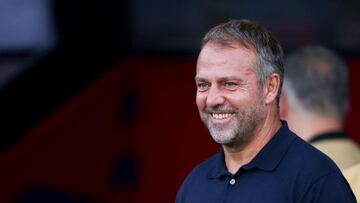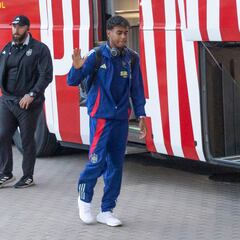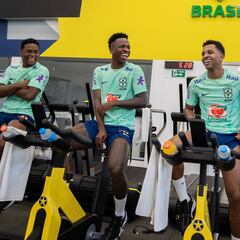Flick’s strict ten commandments at Barça revealed
The German coach is a calm presence, but he’s not without a serious side.

He exudes authority - that’s how those who work with Hansi Flick describe him in the locker room. His is a calm, composed authority without outbursts, but it is authority nonetheless. When the German coach steps into FC Barcelona’s Ciutat Esportiva training ground, everything must be in perfect order. No detail escapes the German’s attention; he is meticulous in every aspect.
Flick has eliminated fines and challenges at the LaLiga club, reintroducing some rules from Xavi’s earlier tenure and establishing new ones. Here, we reveal the ten commandments that have governed the Blaugrana dressing room since Flick’s arrival. These guidelines, structured and rigourous, have been embraced with professionalism and are already contributing to the team’s early-season successes.
1. Punctuality:
Everyone, both players and staff, must arrive at the Ciutat Esportiva 90 minutes before training, which typically begins at 11 a.m. Flick leads by example, often being the first to arrive. Players are expected to have breakfast at the facility, while Flick uses this time to consult with his staff, discuss preparations, check in with doctors on injured players, and coordinate with physical trainers.
Hansi x Ronald pic.twitter.com/rqb51jJE8h
— FC Barcelona (@FCBarcelona) October 12, 2024
2. Daily Weight Check:
Before every training session, players are required to weigh in. This data is recorded and evaluated weekly. So far, no one has had to be reprimanded. Not since Luis Enrique’s time has there been such rigorous monitoring of physical parameters. Flick even added dental checks to the players’ medical tests to ensure a comprehensive health assessment.
3. Mandatory Nutrition Habits:
All staff members are required to eat at the Ciutat Esportiva canteen without exception. While they don’t all have to dine together due to differing schedules, they must all eat from the buffet prepared by the team’s nutritionist, Silvia Tremoleda. While Xavi also encouraged players to eat at the facility, it was never made mandatory.
4. Activation Session on Match Days:
Flick insists on a morning activation session on match days, which he considers vital for game preparation. Some starting lineups have even been adjusted based on these sessions. Though Xavi initially introduced a similar routine during his first season, it was later scrapped due to player complaints.

5. Match-Day Focus:
Along with the return of activation sessions, players now gather at the hotel on match days, even for home games at Montjuïc. This is to avoid any disruptions, such as traffic or other unforeseen issues, ensuring all details are under control.
6. Post-Match rest:
Long, late-night return trips have been eliminated. If an away game ends after 9 p.m. and the flight is longer than 90 minutes, the team stays overnight in the host city. Flick believes players need proper rest after a match and is against returning in the early hours of the morning, exhausted and with little sleep.
7. Long and Intense Training Sessions:
Flick emphasises discipline during training, focusing on physical preparation with the help of Julio Tous, who joined the team this summer. The sessions are rigorous, with each player wearing a GPS tracker to monitor performance data, which is then evaluated. Training typically lasts about 90 minutes, not including pre- and post-session work. In total, players spend around five hours at the Ciutat Esportiva each day.

8. No Financial Penalties or Challenges:
Flick views his players as professionals, making a system of fines or incentives unnecessary. Each player is accountable for their actions, both to the coach and to the team. While acts of indiscipline are still addressed, they are handled through other means, not monetary penalties. Additionally, the pre-match challenges that were once a part of Xavi’s era have been dropped.
9. Limited Time Off:
Flick is passionate about his work and expects the same level of commitment from his players and staff. He believes that to perform at the highest level, full dedication is required in both training and matches. Consequently, he gives his players minimal time off, usually just one day per week. However, during international breaks, when most of the first team is away, he is more lenient - though more out of necessity than preference.
10. Professional Relationships with Players:
Flick is clear that he is the coach, not a father figure or a friend to his players. He maintains excellent communication with the squad, built on respect and commitment, and keeps his office open for discussions. However, he draws a strict line between player and coach, avoiding any favouritism. While he strives to be fair, he does not tolerate interference in his decisions.
🐆 hard work pays off. pic.twitter.com/NT1fYEE3XZ
— FC Barcelona (@FCBarcelona) October 13, 2024
Related stories
The majority of Barcelona’s squad are currently away on international duty with their various teams, although they are set to return within the next week. Their next game in the LaLiga calendar comes at home against Sevilla, and takes place on Sunday 20 October at 3pm ET.
After that, they have a huge challenge in the UEFA Champions League, where they will go up against FC Bayern Munich, Hansi Flick’s former side. That game will take place on Wednesday 23 October and will be played at Montjuïc. At least three days later they have a relaxing fixture: El Clásico.


Complete your personal details to comment